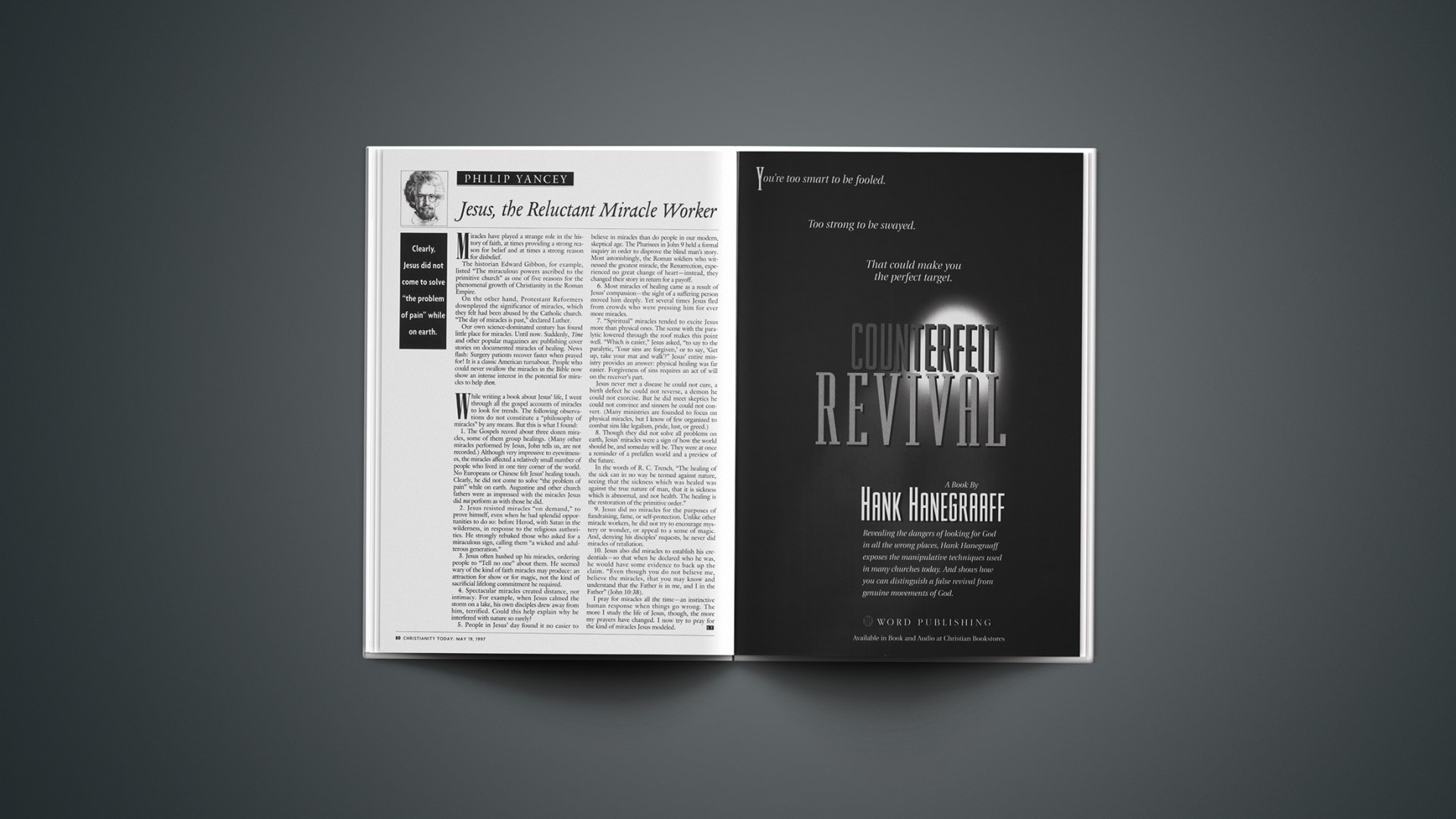Miracles have played a strange role in the history of faith, at times providing a strong reason for belief and at times a strong reason for disbelief.
The historian Edward Gibbon, for example, listed “The miraculous powers ascribed to the primitive church” as one of five reasons for the phenomenal growth of Christianity in the Roman Empire.
On the other hand, Protestant Reformers downplayed the significance of miracles, which they felt had been abused by the Catholic church. “The day of miracles is past,” declared Luther.
Our own science-dominated century has found little place for miracles. Until now. Suddenly, Time and other popular magazines are publishing cover stories on documented miracles of healing. News flash: Surgery patients recover faster when prayed for! It is a classic American turnabout. People who could never swallow the miracles in the Bible now show an intense interest in the potential for miracles to help them.
While writing a book about Jesus’ life, I went through all the gospel accounts of miracles to look for trends. The following observations do not constitute a “philosophy of miracles” by any means. But this is what I found:
1. The Gospels record about three dozen miracles, some of them group healings. (Many other miracles performed by Jesus, John tells us, are not recorded.) Although very impressive to eyewitnesses, the miracles affected a relatively small number of people who lived in one tiny corner of the world. No Europeans or Chinese felt Jesus’ healing touch. Clearly, he did not come to solve “the problem of pain” while on earth. Augustine and other church fathers were as impressed with the miracles Jesus did not perform as with those he did.
2. Jesus resisted miracles “on demand,” to prove himself, even when he had splendid opportunities to do so: before Herod, with Satan in the wilderness, in response to the religious authorities. He strongly rebuked those who asked for a miraculous sign, calling them “a wicked and adulterous generation.”
3. Jesus often hushed up his miracles, ordering people to “Tell no one” about them. He seemed wary of the kind of faith miracles may produce: an attraction for show or for magic, not the kind of sacrificial lifelong commitment he required.
4. Spectacular miracles created distance, not intimacy. For example, when Jesus calmed the storm on a lake, his own disciples drew away from him, terrified. Could this help explain why he interfered with nature so rarely?
5. People in Jesus’ day found it no easier to believe in miracles than do people in our modern, skeptical age. The Pharisees in John 9 held a formal inquiry in order to disprove the blind man’s story. Most astonishingly, the Roman soldiers who witnessed the greatest miracle, the Resurrection, experienced no great change of heart—instead, they changed their story in return for a payoff.
6. Most miracles of healing came as a result of Jesus’ compassion—the sight of a suffering person moved him deeply. Yet several times Jesus fled from crowds who were pressing him for ever more miracles.
7. “Spiritual” miracles tended to excite Jesus more than physical ones. The scene with the paralytic lowered through the roof makes this point well. “Which is easier,” Jesus asked, “to say to the paralytic, ‘Your sins are forgiven,’ or to say, ‘Get up, take your mat and walk’?” Jesus’ entire ministry provides an answer: physical healing was far easier. Forgiveness of sins requires an act of will on the receiver’s part.
Jesus never met a disease he could not cure, a birth defect he could not reverse, a demon he could not exorcise. But he did meet skeptics he could not convince and sinners he could not convert. (Many ministries are founded to focus on physical miracles, but I know of few organized to combat sins like legalism, pride, lust, or greed.)
8. Though they did not solve all problems on earth, Jesus’ miracles were a sign of how the world should be, and someday will be. They were at once a reminder of a prefallen world and a preview of the future.
In the words of R. C. Trench, “The healing of the sick can in no way be termed against nature, seeing that the sickness which was healed was against the true nature of man, that it is sickness which is abnormal, and not health. The healing is the restoration of the primitive order.”
9. Jesus did no miracles for the purposes of fundraising, fame, or self-protection. Unlike other miracle workers, he did not try to encourage mystery or wonder, or appeal to a sense of magic. And, denying his disciples’ requests, he never did miracles of retaliation.
10. Jesus also did miracles to establish his credentials—so that when he declared who he was, he would have some evidence to back up the claim. “Even though you do not believe me, believe the miracles, that you may know and understand that the Father is in me, and I in the Father” (John 10:38).
I pray for miracles all the time—an instinctive human response when things go wrong. The more I study the life of Jesus, though, the more my prayers have changed. I now try to pray for the kind of miracles Jesus modeled.
Copyright © 1997 Christianity Today. Click for reprint information.










